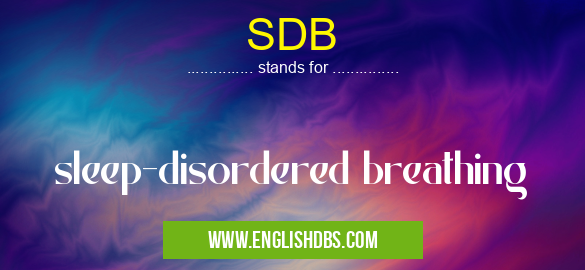What does SDB mean in MEDICAL
Sleep-disordered breathing (SDB) is a broad category of medical conditions and sleep disturbances related to difficulty in breathing during sleep. It encompasses several different types of problems, from snoring and upper airway resistance syndrome to more serious conditions like obstructive sleep apnea. SDB is common among adults, although it can affect children as well.

SDB meaning in Medical in Medical
SDB mostly used in an acronym Medical in Category Medical that means sleep-disordered breathing
Shorthand: SDB,
Full Form: sleep-disordered breathing
For more information of "sleep-disordered breathing", see the section below.
Essential Questions and Answers on sleep-disordered breathing in "MEDICAL»MEDICAL"
What are the symptoms of SDB?
Symptoms of SDB can vary depending on the underlying condition causing the disorder, but may include loud snoring, waking up with a dry mouth or sore throat, feeling fatigued during the day despite adequate rest at night, gasping or pausing during sleep, and difficulty concentrating during the day. In some cases people may experience high blood pressure and difficulty sleeping.
How is SDB diagnosed?
A diagnosis of SDB may be made based on physical exam findings as well as lab tests such as an overnight oximetry test which measures oxygen levels in your blood while asleep. Polysomnography (PSG) is another comprehensive diagnostic study used to evaluate for sleep apnea. This involves spending a night at a specialized lab where you will be monitored for evidence of sleep-disordered breathing such as pauses in breathing or irregular patterns in heart rate or oxygen levels while sleeping.
What are some treatments available for SDB?
Treatment options vary depending on the severity and underlying cause of the disorder but may include lifestyle changes such as eliminating smoking and drinking alcohol before bedtime, losing weight if needed, and avoiding sleeping on your back (or using pillows to prevent this). Other treatments may involve using a CPAP machine or oral appliance, surgery, or even behavioral therapy (for children).
What specific health risks are associated with SDB?
Left untreated, individuals with OSA may experience adverse health effects over time including chronic fatigue, hypertension (high blood pressure), stroke risk increase due to lack of oxygen supply to the brain at night, increased risk for diabetes due to fluctuating hormones related to interrupted sleep cycles,asthma flare ups due to oxygen desaturation at night time etc. Additionally mental health issues like depression are more likely due to dysregulated hormones from lack of deep/restorative sleep.
How can I prevent Sleep Disordered Breathing?
There are several ways you can reduce your risk for developing Sleep Disordered Breathing including maintaining a healthy weight; getting regular exercise; avoiding alcohol close to bedtime; keeping bedrooms free from allergens; practising good sleeping habits such as going to bed and waking at the same time each day; sleeping on your side instead of your back; reducing overall stress levels; and receiving treatment for any chronic illnesses like asthma or allergies.
Final Words:
SDB is a group of medical conditions that involve difficulty breathing while asleep that can lead to serious health consequences if left untreated. If you think you might be suffering from one of these conditions it's important that you consult with a healthcare professional who can diagnose and treat it accordingly. By understanding the symptoms and taking preventive measures like exercising regularly and avoiding alcohol close to bedtime you can help lower your chances for developing Sleep Disordered Breathing in the first place.
SDB also stands for: |
|
| All stands for SDB |
